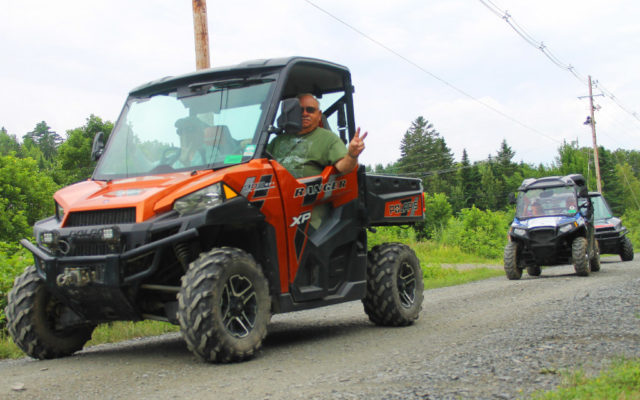
Maine’s trail system is still a mess from storm devastation as ATV season opens
By Julie Harris, Bangor Daily News Staff
A new $60,000 bridge on an ATV trail near Strong was destroyed, and needs to be rebuilt. A trail washout in Bemis that left a 40-foot hole will cost $160,000 to fix. And it will cost more than $1 million to repair the 19 bridges damaged or washed out in the state’s motorized sports trail system, according to a state official.
Maine’s ATV club volunteers are scrambling to repair and open trails for the season, and some won’t open at all this year. The 100-year storms, primarily in December and January, followed by more rain, left unspeakable damage to trailbeds and downed trees in their wake. Although snowmobile clubs patched a system together for the low-snow season, many of those repairs were temporary.
The price tag to fix the storm damage is estimated between $6 million and $7 million, according to Brian Bronson, ATV program supervisor for the Maine Bureau of Parks and Land in the Maine Department of Agriculture, Conservation and Forestry.
But the money for all the repairs isn’t there. There’s only between $4 million and $5 million allocated by the state to ATV trails this year, Bronson said, and other government funding sources won’t be available until after the ATV season. He has encouraged clubs to seek grants or municipal and county money.
Ultimately, the extensive damage and the inability to fix it means the $1.4 billion that motorized sports contribute to Maine’s economy is in jeopardy this year. ATVs represent approximately $774 million of that, according to ATV Maine President John Raymond.
The state likes to have the ATV trails open by May 15, he said. But some won’t open until Memorial Day weekend, about two weeks late. The ones that don’t open by then may stay closed for the season.
“There’s very expensive damage in spots. We’re working with clubs and landowners and it’s going to take time, money and people to do it right,” Bronson said.
Having the money alone wouldn’t be enough, he said. Land access, paperwork and a lack of contractors to do the repairs are all factors. About 95 percent of the trail system is on private lands, so property owners have to be consulted while damage on public land is waiting for Federal Emergency Management Agency funds.
Central and western Maine were the hardest hit, Bronson said. The Pittston Farm trail system in Rockwood, which usually opens Memorial Day weekend, is so badly damaged that it will stay closed until July 4. Sections of the Whistle Stop Trail from Jay to Farmington will remain closed for the season. Only a handful of rail trails will open.
At least one trail in the Bemis area is stuck between two FEMA projects that contractors cannot get to until August. Five bridges in Vanceboro are out, but the Department of Environmental Protection will not allow workers to access them until late June or early July.
The Forks Area Trails Club has to reroute a trail to Bingham because a 130-foot bridge over Austin Stream was destroyed, and the soil is too saturated to get repair equipment on some trails, according to Benjamen Towle, club trailmaster.
“Due to the storm damage, we will be years repairing the base of our (trail) system,” Towle said, emphasizing that every trail was affected by the storms.
“We did the patch-up for snowmobile trails, but now we are figuring out more permanent fixes. We hope to put stuff back in a way that they won’t wash out again. Bridges need to survive significant storms with the water flow more than we’ve ever seen,” Bronson said. “We’re rebuilding the system.”
Clubs are working together. Last weekend, up to 60 people from 13 different clubs met in Strong to figure out how to reconnect trails, he said.
It’s not just those who use the trails who are affected by the weather. Between a lack of snow and damaged trails, a lot of small businesses are hurting, Bronson said, pointing out how much they rely on motorized recreational sports to keep afloat.
He encouraged people to get involved with their local clubs. Only 10 percent of ATV owners belong to a club, he said.
Some costs were resolved in this session of the Legislature, Bronson said. The governor signed a bill that changed the allocation of gas tax money between boating, snowmobiling and ATVing that had not been revised since 2002. Since then, participation in ATVing has skyrocketed while boating and snowmobiling has declined, according to state data.
ATVs will get about $600,000 next year, rather than the $160,000 it got this year, Raymond said.
The Legislature also approved sending a $30 million bond to voters in November that would be used for all types of trails in the state.